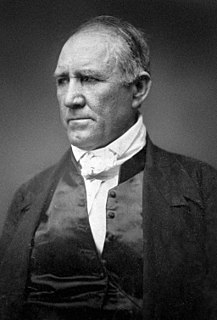A Quote by John Adams
The numbers of men in all ages have preferred ease, slumber, and good cheer to liberty, when they have been in competition.
Related Quotes
In all ages of the world, priests have been enemies to liberty; and it is certain, that this steady conduct of theirs must have been founded on fixed reasons of interest and ambition. Liberty of thinking, and of expressing our thoughts, is always fatal to priestly power, and to those pious frauds, on which it is commonly founded; and, by an infallible connexion, which prevails among all kinds of liberty, this privilege can never be enjoyed, at least has never yet been enjoyed, but in a free government.
Liberty, next to religion has been the motive of good deeds and the common pretext of crime, from the sowing of the seed at Athens, 2,460 years ago, until the ripened harvest was gathered by men of our race. It is the delicate fruit of a mature civilization; and scarcely a century has passed since nations, that knew the meaning of the term, resolved to be free. In every age its progress has been beset by its natural enemies, by ignorance and superstition, by lust of conquest and by love of ease, by the strong man's craving for power, and the poor man's craving for food.
The liberty I mean is social freedom. It is that state of things in which liberty is secured by the equality of restraint. A constitution of things in which the liberty of no one man, and no body of men, and no number of men, can find means to trespass on the liberty of any person, or any description of persons, in the society. This kind of liberty is, indeed, but another name for justice.
...It looked very different from the Statue of Liberty, but what did that matter? What was the good of having the statue without the liberty, the freedom to go where one chose if one was held back by one's color? No, I preferred the Eiffel Tower, which made no promises." ~ Josephine Baker, once she had seen the Eiffel Tower
Let us not be unmindful that liberty is power, that the nation blessed with the largest portion of liberty must in proportion to its numbers be the most powerful nation upon earth. Our Constitution professedly rests upon the good sense and attachment of the people. This basis, weak as it may appear, has not yet been found to fail. Always vote for a principle, though you vote alone, and you may cherish the sweet reflection that your vote is never lost. America, in the assembly of nations, has uniformly spoken among them the language of equal liberty, equal justice, and equal rights.
Those who professed themselves unable to believe in the reality of human progress ought to cheer themselves up, as the students under examination had conceivably been cheered up, by a short study of the Middle Ages. The hydrogen bomb, the South African Government, Chioang Kaidick, Senator McCarthy himself, would then seem a light price to pay for no longer being in the Middle Ages.
We learned long ago that liberty could be preserved only by limiting in some way the freedom of action of individuals; that otherwise liberty would necessarily yield to absolutism; and in the same way we have learned that unless there be regulation of competition, its excesses will lead to the destruction of competition, and monopoly will take its place.

































